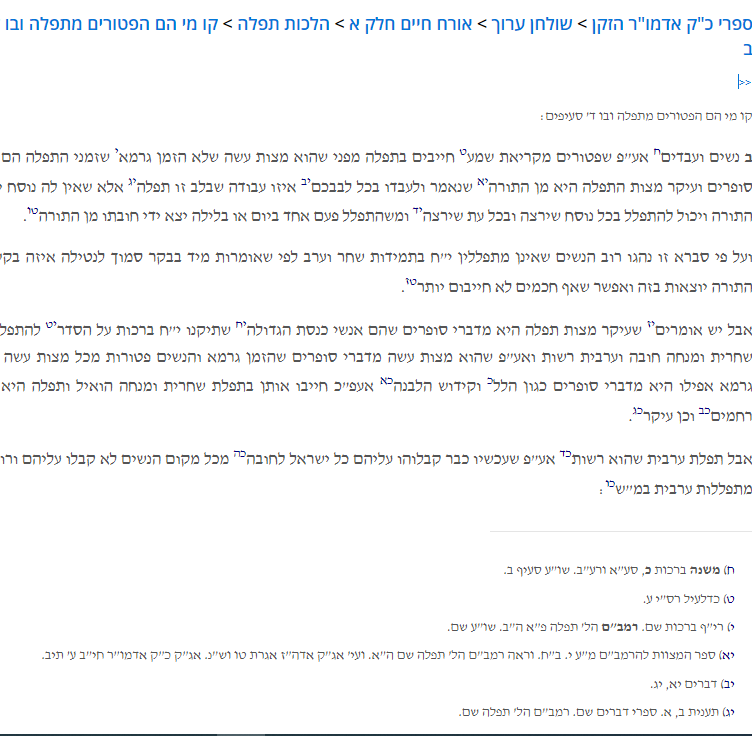BSD
Suka 53a
Tamuz 22, 5783. July 11, 2023
תניא אמר ר’ יהושע בן חנניה כשהיינו שמחים שמחת בית השואבה לא ראינו שינה בעינינו כיצד שעה ראשונה תמיד של שחר משם לתפלה משם לקרבן מוסף משם לתפלת המוספין משם לבית המדרש משם לאכילה ושתיה משם לתפלת המנחה משם לתמיד של בין הערבים מכאן ואילך לשמחת בית השואבה איני והאמר רבי יוחנן אשבועה שלא אישן שלשה ימים מלקין אותו וישן לאלתר אלא הכי קאמר לא טעמנו טעם שינה דהוו מנמנמי אכתפא דהדדי:
We have learned in a Beraisa : Reb Joshua ben Reb Hananiah said: When we were engaged in rejoicing at the drawing of water, our eyes saw no sleep. How so?

The first hour for the morning daily sacrifice; afterwards for praying, and from that to the מוספים; after that the מוסף prayer; afterwards we went to the house of learning; from there we went to eat and drink at home, and afterwards the Mincha prayer; and from the Mincha prayer to the daily evening sacrifices, and from that time we rejoiced at the drawing of the water till the morning.

They did not sleep for seven days?
Did not Reb Yochanan say: If one says: ‘I swear I will not sleep three days’, he gets מלקות for a false oath, and can go to sleep immediately?

He meant to say: We have not tasted any sleep, but we napped each on the other’s shoulders.
We touched upon a few topics of this ברייתא.
1- Sleeping outside of a Suka.
Our eyes saw no sleep.
We have not tasted any sleep, for we slept on each other’s shoulders.

How did these חסידים ואנשי מעשה take a nap outside a Sukkah?
The Halachah is that sleeping in a Sukkah is a requirement and unlike eating, where a snack is permitted to be eaten outside a Suka, sleeping out of a the Sukkah is prohibited – even a שינת ארעי.
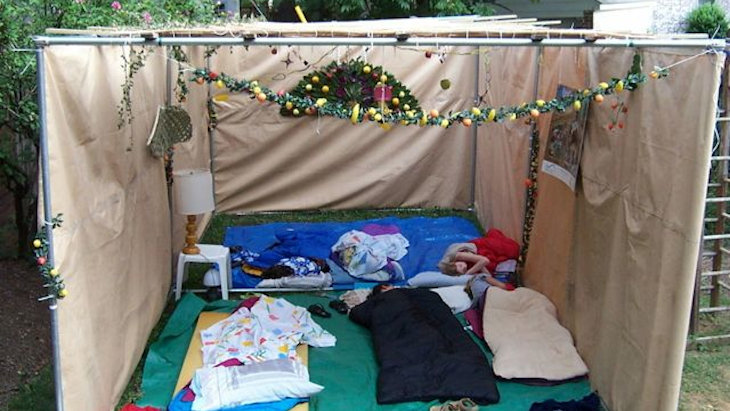
The תשב”ץ discusses (א, ק) the issue of the חסידים ואנשי מעשה that participated in שמחת בית השואבה and took a quick nap ‘on the shoulder’ of others. It seems that this nap was not in a Suka.
The תשב”ץ suggests that perhaps the reason for the איסור for a short nap outside a Suka is only a חשש, as one may sleep for a long time.
So according to the תשב”ץ, a שינת ארעי would be permitted, at least מן התורה.
[Perhaps he also meant that these חסידים ואנשי מעשה had no fear to sleep for a long time since there were napping while on their feet].
Others apply the rule of העוסק במצוה פטור מן המצוה. This would answer the question on these חסידים ואנשי מעשה that took a nap outside the Sukkah.
The Rebbe writes about this ברייתא that ‘perhaps this is the source for Chasidim not sleeping in a Sukkah’. See here: LS 19, 272. Footnote 48.
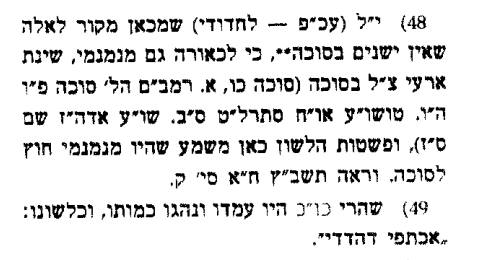
We also discussed the lengthy שיחה of the Rebbe explaining the מנהג חב”ד not to sleep in the Sukkah based on the above story that occurred at שמחת בית השואבה. See here. LS 29 page 211 and on.
2- Davening בזמן הבית.
The first hour for the morning daily sacrifice; afterwards for praying,
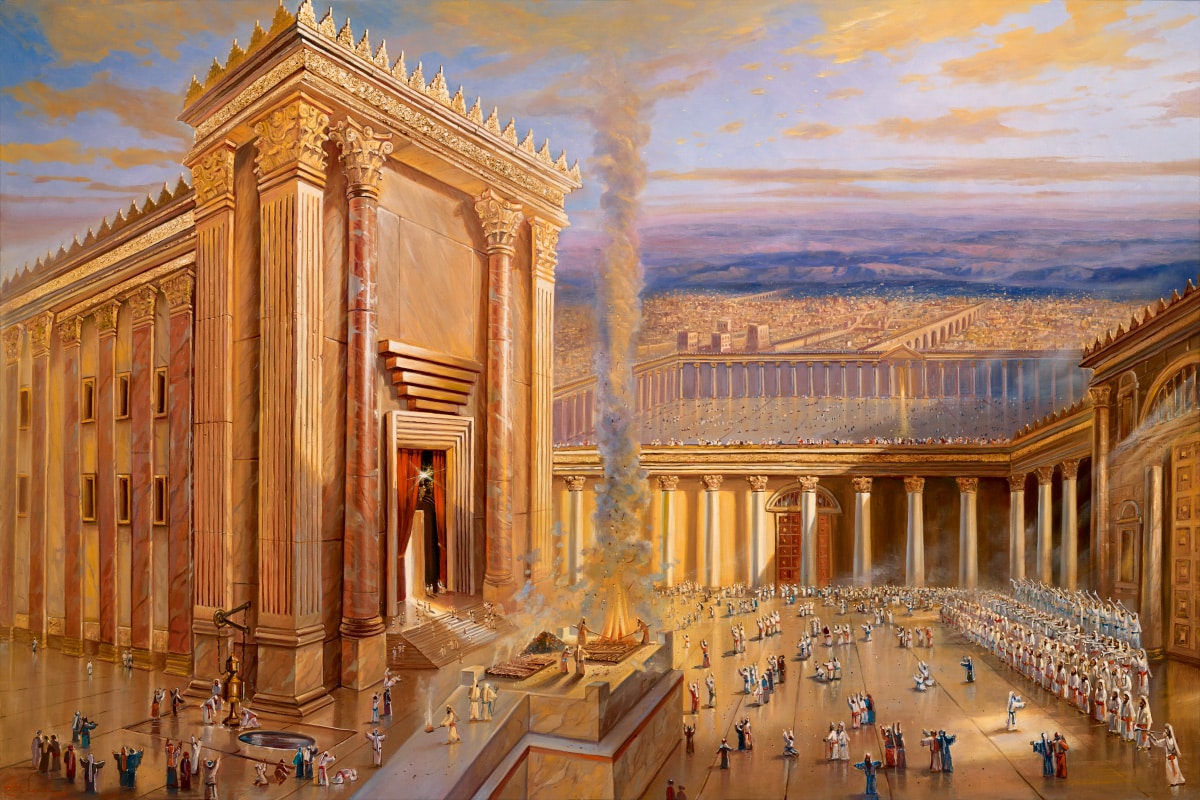
Praying in the בית המקדש? Don’t we always say: תפילות במקום קרבנות תקנום?
So we discussed another תשב”ץ. This one is in 2, 161.
He derives from our גמרא that indeed, there was תפילה in the בית המקדש. Undoubtedly, he adds, their נוסח was different that ours. Surely they didn’t say ותחזינה עינינו בשובך לציון ברחמים or
שיבנה בית המקדש …
See there more details and the ירושלמי he quotes.
3 – Women davening Musaf
And from that to the מוספים; after that the מוסף prayer
Mentioned the famous Reb Akiva Eiger (9) that women are not obligated to daven Musaf.

Whereas שחרית and מנחה (or any short תפילה) they are obligated to daven daily, (either because it’s not a מצות עשה שהזמן גרמא or because they are asking for רחמי. See below from the Alter Rebbe’s Shulchan Aruch) davening Musaf on the other hand, is only a commemoration of the קרבן מוסף.
This Korban, being a קרבן ציבור was acquired from the מחצית השקל that was collected yearly. Now, since women are פטור from מחצית השקל they have no obligation to Daven מוסף.
[Others disagree with Reb Akiva Eiger’s Psak].
The question asked by many is from the above story where R. Joshua ben R. Hananiah says that they went to daven Musaf. But R. Joshua was a Levi and Leviim didn’t need to give מחצית השקל as well. So why did he daven Musaf?
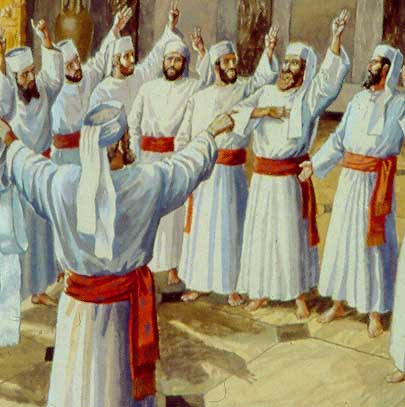
[It’s a ‘weak’ question. Maybe he was referring to the others. Additionally, while there is no obligation, it does not mean one cannot daven Musaf].
4 – Not sleeping for 3 days.
If one says: I swear I will not sleep three days, he gets מלקות for a false oath, and can go to sleep immediately
The simple reason he gets מלקות is that a human cannot control his lack of sleep and will surely fall asleep.
What about eating? A person can control his eating and refrain from earring until he ‘expires’ from hunger. See here in Rambam and Kesef Mishna.
How long can one last?

In מגילת אסתר it says that Esther requested that מרדכי to declare a 3 day fast.
לֵךְ כְּנוֹס אֶת כָּל הַיְּהוּדִים הַנִּמְצְאִים בְּשׁוּשָׁן וְצוּמוּ עָלַי וְאַל תֹּאכְלוּ וְאַל תִּשְׁתּוּ שְׁלֹשֶׁת יָמִים לַיְלָה וָיוֹם גַּם אֲנִי וְנַעֲרֹתַי אָצוּם כֵּן וּבְכֵן אָבוֹא אֶל הַמֶּלֶךְ אֲשֶׁר לֹא כַדָּת וְכַאֲשֶׁר אָבַדְתִּי אָבָדְתִּי.
We discussed that in Yevamos 121b It says explicitly that they fasted 3 days with no breaks.
On the other hand , in מדרש רבה and other places it says that they did break their fast every night. They explain the פסוק as follows:
לֵךְ כְּנוֹס אֶת כָּל הַיְּהוּדִים הַנִּמְצְאִים בְּשׁוּשָׁן – to daven.
וְצוּמוּ עָלַי וְאַל תֹּאכְלוּ וְאַל תִּשְׁתּוּ שְׁלֹשֶׁת יָמִים – meaning to fast just 3 days. Not the nights.
And we should pray – לַיְלָה וָיוֹם
———————————–
